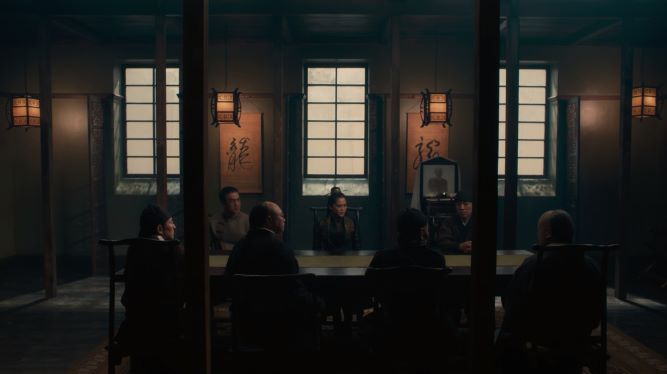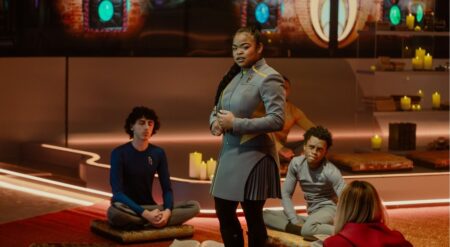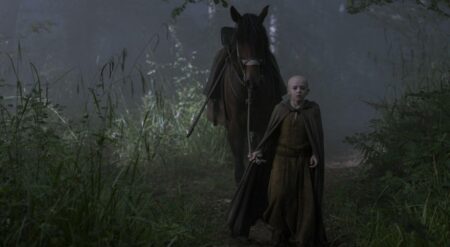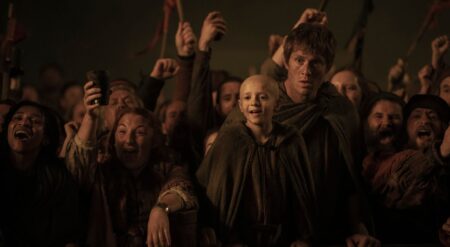Warrior, Cinemax’s new Old West series based on the writings of Bruce Lee, has had a near-perfect first season so far. In episode nine, “Chinese Boxing,” the series offers up the best one-versus-one martial arts fight ever shown on television and continues to raise the stakes for the season one finale airing next week.
Last episode, the two warring Tongs, the Long Zii and the Hop Wei, agreed to put their very public war to a stop – at least until after their respective chosen fighter competes in the ring. With the rights to the Opium trade, or as its called by the Tongs in the show, molasses, at the center of the fight, Li Yong (Joe Taslim) and Ah Sahm (Andrew Koji) are ready to do battle.
With the duel happening early on in “Chinese Boxing,” the episode is able to do what it does best, showcase its characters and not just the fight. As much as the duel is both pivotal, exciting, and perfectly choreographed, it is also the catalyst for many of the characters’ development in this episode.
While actors Koji and Taslim expertly execute the fight, which utilizes some of Bruce Lee’s iconic moves, it’s their acting and not just their athletic bodies and fighting acumen that is on display. With both men are being pushed passed their physical limits, it’s their mission, their goal, their meaning in life that keeps them going and ultimately leads to why the victor is able to take his body being shattered and still get up.
Li Yong, seems to lose. He is down, his body is broken easily by the larger and faster Ah Sahm, but what his opponent doesn’t know is that he fights for something bigger than him, the Long Zii, and for its new leader, Mai Ling (Dianne Doan). Taslim’s acting in the moment of his seeming defeat and revival is simply perfect. There is a determination in his face and a need in his actions. In contrast, Koji brings desperation and confusion as he starts to truly lose when his strength begins to outmatched by Li Yong’s heart.

The success of this duel reaches the epic scale built up through the training we saw in the last episode and at the beginning of “Chinese Boxing.” This is also due to Brett Chan‘s fight coordination and to the episode’s director’s, Loni Peristere, ability to shoot the fight. The editing is minimal, the lighting is perfection, the close-ups of brutal impact as the sound of cracking and the slap of skin against bloodied skin is beautiful and brutal. This is the best fight scene I have ever seen on television. While I love the wuxia influenced fights of Into the Badlands of which I believe have some of the best action sequences ever brought to television, there is a beauty and brutality in this fight, it’s raw, it’s simple, and showing the aftermath of in Ah Sahm’s torn face highlights that.
With death in front of Ah Sahm, it’s Big Bill (Kieran Bew), who intervenes, shooting into the air and stopping the fight right before his neck is snapped, in front of the eyes of all of Chinatown, and his love interest Penelope (Joanna Vanderham). By being there and audibly screaming in fear for Ah Sahm’s life, she exposes their affair to Bill, while the two act ignorant of the truth it’s apparent. Bill has come a long way from setting up Ah Sahm to be beaten to death, even if he is being hunted by the Fung Hai and pulling those in his life into their crosshairs.
While Ah Sahm lays, bloodied, bruised, with his body and spirit torn, and blood gurgling in his throat as he breathes, we see into his identity. We are given a deep look into the man that we have seen show no weakness. We learn about his childhood, his sister, his actions, and ultimately his guilt. This episode serves to knock Ah Sahm down, to point out that a man with nothing to fight for other than his own pride cannot survive, and it makes us question who Ah Sahm will become upon healing.
While the action is on point in “Chinese Boxing,” the costuming is spectacular. With Doan commenting in the inside look of the episode that her clothes during the duel were to establish her as a “dragon queen,” to display her power in her Tong and the situation. Her dress worn to the duel is toned down once she assumes the official status as head of the Long Zii, but the power remains.
The power is practical and her choice to kill a dissenter, much like she did to the leader of the Fung Hai details that her costuming is representative of her power not the only thing about her. Mai Ling has the knowledge of Long Zii, and because those around her will look to stand up against her and question her authority because she is a woman, she will act with ruthlessness and cement her status.

Similarly, Ah Toy (Olivia Cheng) continues to be dressed to the nines, her style is out of place and time, influenced by traditional but modernized and exaggerated for the 19th-century setting. Ah Toy’s clothing showcases that she as living in both Chinatown and San Francisco but she is not apart of them. She is not a part of Chinatown and she is not a part of the larger city. She is a Chinese woman relegated to nothingness from parts of her identity and she defies it, as we’ve seen in previous episodes. While her character is a caregiver in this episode, we’ve seen her ability to fight, to overcome, and to take her own agency while others deny it, and the volume of her costuming in this episode showcases that.
In addition to taking care of the injured Ah Sahm, Ah Toy sets the path forward for Ah Sahm, who as the trailer for episode 10 shows will be a worker and not a respected Tong member. He is just like the Chinese who come into the city every day to live a life of being oppressed, of being looked down on, of not belonging. While Ah Sahm attempts to brush off the call to fight for something larger, for the people of Chinatown like Ah Toy has chosen to do, he says that the Chinese will always be out of place. To which Ah Toy responds, no one is accepted in San Francisco, the United States, they didn’t belong in the beginning, so why should the Chinese people who contribute their work, their bodies, their lives, be any different?
Overall, “Chinese Boxing” subverts our expectations. The hero of the story, the protagonist loses everything. He loses the fight, the Tong, and whatever semblance of a life he began to build in San Francisco. But with Ah Sahm forsaken by the Hop Wei and his sister, how will the story progress? With one episode left, our protagonist is at his lowest and Mai Ling is at her strongest and with her power, a storm is brewing. In addition, Bill’s gambling has put his partner at death’s door. Everything in “Chinese Boxing” solidifies Warrior‘s status as the best show on television and leaves me anxiously waiting for the finale.
Warrior is available now on MAX (formerly HBO Max) and Netflix.
Warrior, Episode 9 - Chinese Boxing
-
Rating - 10/1010/10
TL;DR
“Chinese Boxing” subverts our expectations. The hero of the story, the protagonist loses everything. He loses the fight, the Tong, and whatever semblance of a life he began to build in San Francisco. But with Ah Sahm forsaken by the Hop Wei and his sister, how will the story progress?







